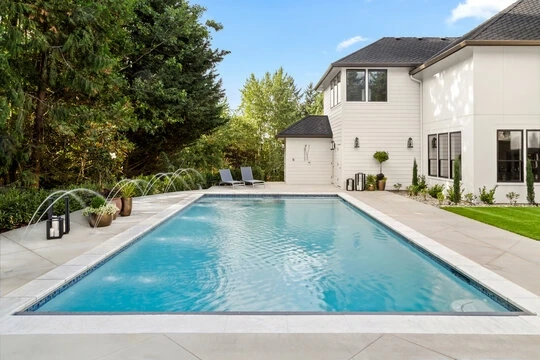Having a swimming pool at home can turn your backyard into a private paradise, providing endless fun, relaxation, and exercise opportunities. However, the luxury of owning a pool comes with significant responsibility. Ensuring your pool is safe is paramount, and that's where regular swimming pool safety inspections come in. At My Home Pool, we understand the importance of maintaining a safe swimming environment, and we’re here to guide you through the essentials of swimming pool safety inspections.
Why Swimming Pool Safety Inspections Matter
Safety inspections for swimming pools are crucial for several reasons:
Preventing Accidents: Regular inspections help identify potential hazards such as faulty gates, broken fences, slippery surfaces, and improper pool covers, reducing the risk of accidents and injuries.Regulatory Compliance: Pool safety regulations vary by region, and staying compliant is essential. Inspections ensure your pool meets local safety standards, helping you avoid fines and legal complications.Peace of Mind: Knowing your pool is safe for family, friends, and guests allows you to enjoy it without constant worry, making your leisure time truly relaxing.What a Pool Safety Inspection Involves
A thorough swimming pool safety inspection covers various aspects of your pool and its surroundings. At My Home Pool, our inspection process includes:
Fencing and Barriers: Inspectors check that pool fencing is of the correct height, gates are self-closing and self-latching, and there are no gaps or climbable objects nearby that could provide unauthorized access.Pool Covers and Alarms: Ensuring that pool covers are secure and that pool alarms are functional provides an additional layer of safety, alerting you to any unauthorized or accidental entry into the pool area.Water Quality and Cleanliness: Evaluating the water’s chemical balance and clarity is crucial for preventing health hazards and ensuring a pleasant swimming experience.Safety Equipment: Inspectors verify the presence and condition of essential safety equipment such as life rings, first aid kits, and reaching poles, ensuring they are easily accessible and in good working order.Signage: Appropriate safety signs, including CPR instructions and emergency contact numbers, must be clearly visible around the pool area to inform and guide pool users in case of an emergency.Benefits of Professional Inspections
While some aspects of pool safety can be self-monitored, professional inspections offer several distinct advantages:
Expertise and Experience: Certified inspectors possess the knowledge to identify subtle hazards that might be overlooked by an untrained eye.Thorough Assessments: Professionals use comprehensive checklists and tools to ensure no aspect of pool safety is missed.Updated Compliance: Safety regulations can change, and professionals stay updated on the latest standards, ensuring your pool remains compliant with current laws.Preparing for a Pool Safety Inspection
To make the most of your swimming pool safety inspection, follow these preparatory steps:
Clean the Pool Area: Ensure the pool and its surroundings are clean and free from debris, making it easier for inspectors to assess all areas thoroughly.Gather Documentation: Have any previous inspection reports, maintenance records, and safety certificates on hand to provide a complete overview of your pool's safety history.Ensure Accessibility: Make sure all gates and entry points are accessible and functioning properly to facilitate a comprehensive inspection.Post-Inspection Actions
After the inspection, you will receive a detailed report highlighting any issues and recommended corrective actions. Here’s how to proceed:
Prioritize Repairs: Address identified hazards promptly to ensure safety and compliance with local regulations.Regular Maintenance: Schedule regular maintenance to keep the pool and safety equipment in good condition and to prevent future issues.Reinspection: If significant issues were found, arrange for a follow-up inspection to confirm that all necessary repairs have been made and that your pool is safe for use.Our Commitment to Pool Safety
At My Home Pool, our commitment to safety extends beyond inspections. We provide educational resources and support to help pool owners maintain a safe swimming environment year-round. Our goal is to ensure that every pool is a safe place for fun and relaxation, free from avoidable risks.
Tips for Maintaining Pool Safety
In addition to regular inspections, here are some tips for maintaining a safe pool environment:
Supervise Children: Always keep an eye on children when they are near or in the pool. Never leave them unattended, even for a moment.Teach Swimming and Safety Skills: Ensure that all pool users, especially children, know how to swim and understand basic pool safety rules.Install Safety Features: Consider installing additional safety features such as pool alarms, safety covers, and anti-entrapment drain covers to enhance pool safety.Regularly Check Equipment: Periodically check the condition of safety equipment and replace any items that are damaged or worn out to ensure they are effective when needed.In conclusion, swimming pool safety inspections are a critical aspect of responsible pool ownership. They help prevent accidents, ensure regulatory compliance, and provide peace of mind. By partnering with My Home Pool for your safety inspections, you can be confident that your pool is in expert hands, allowing you to enjoy your aquatic oasis worry-free.


